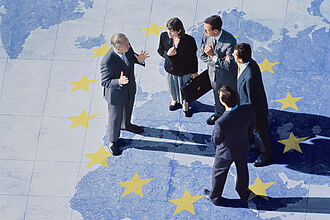The work of the UINL: Institutional Meetings prior to the Congress
The congress was preceded by the Institutional Meetings of the UINL from 28 September to 1 October. These biannual sessions form the core of the Union's work on international notarial matters during which delegates from the 92 member notariats set the course for global cooperation. Over several days, the UINL commissions and working groups addressed key issues such as international notarial cooperation, anti-money laundering and cooperation with other international organisations.
Particular attention was given to the election of the new UINL President for the 2026–2028 term – a result that will determine the Union’s strategic direction for the years ahead. In the end, the Mexican candidate David Figueroa Márquez prevailed over Olagnika Salam from Benin. Furthermore, Prof. Dr. Jens Bormann was re-elected as UINL Vice-President for Europe.
A brilliant start and innovative topics
The official opening of the World Congress followed the UINL Institutional Meetings on 2 October. The notariats of Kyrgyzstan and Burundi were welcomed as new members of the Union during the ceremony that demonstrated the growing global reach of the UINL. High-ranking judicial and political personalities, including the President of the German Federal Constitutional Court Prof. Dr. Stephan Harbarth, German Federal Minister of Justice Dr. Stefanie Hubig, and Berlin Senator of Justice Dr. Felor Badenberg, underscored with their presence and opening speeches the relevance of the notarial profession to the modern legal system.
The congress was held under the leitmotif “The Notarial Profession on the Move I New Technologies – New Roles.” This highly topical theme reflects the dynamic challenges and opportunities facing the profession in an increasingly digitalised world.
Guiding the way into the digital future: Theme I
The opening ceremony was followed by exciting panel discussions on “New tools | New frontiers: Notaries at the heart of a digital system fit for the future.” In various discussion panels, experts including State Secretary Prof. Dr. Luise Hölscher, Dr. Aljoscha Burchard, Principal Researcher, Research Fellow and Deputy Site Manager at the German Research Centre for Artificial Intelligence (DFKI), Dr. Dr. Oliver Hofmann, Head of Legal Tech at the C.H.Beck Publishing House, and Dr. Markus Sikora, President of Bundesnotarkammer, explored the opportunities and risks of automation and artificial intelligence for the notarial profession. They highlighted the central responsibilities in dealing with these technologies and deliberated on best practices for the present and the future.
Citizen-oriented and efficient: Theme II
On the second congress day, 3 October 2025, the focus turned to “Non-contentious proceedings: new roles at the service of the public.” Participants discussed how notaries can increasingly apply their expertise in areas such as family and succession law, emphasising the essential role of preventive justice as an alternative to often resource-intensive court proceedings. Through their legally binding and impartial work, notaries enable citizens to settle their legal matters efficiently and consensually, which not only provides greater legal certainty but also significantly reduces the burden on the courts. The debates underlined that by assuming additional tasks in the non-contentious area, the notarial profession can make a major contribution to stabilising peace in society.
The values of continental law: the International Forum
The last day of the congress, 4 October 2025, was devoted to the International Forum under the theme “The Values of Continental Law – Protection, Prevention, Pacification”. This event offered an in-depth reflection on the fundamental principles that characterise the Latin notarial profession. Eminent speakers such as the President of the Council of Notaries of the European Union (CNUE) Cosita Delvaux and Prof. Dr. Jan Lieder, Dean of the Faculty of Law at the Albert Ludwig University of Freiburg highlighted the responsibility of the notarial profession towards civil society and the undeniable added value of preventive administration of justice by notaries as holders of a public office. The Forum reaffirmed that notaries as neutral and independent public officials, protect the values of continental law and thus make a significant contribution to stability and legal certainty in society.
More than just technical discussions: a lasting exchange
Beyond the challenging professional programme, the congress also provided participants with an excellent opportunity to establish new international relationships and foster existing ones. It promoted more than just professional discourse; it created a setting for personal encounters and helped colleagues from around the world to deepen their relationships.
The diverse social programme allowed guests to explore the metropolis of Berlin and learn about its history. The excursions, from the exclusive “Berlin Classics” city tour to excursions to Potsdam, created lasting memories. Evening highlights during the Institutional Meetings included a cocktail reception at the James Simon Gallery and a gala dinner at the Jewish Museum. The closing evening of the congress held in the historic Arminius Market Hall rounded off an eventful week in Berlin. This variety of social events gave participants the opportunity to have conversations in a relaxed atmosphere and share special moments of international and intercultural exchange, fostering the spirit of global cohesion within the notarial community.
The 31st International Congress of Notaries will therefore be remembered not only as a landmark professional event, but also as an occasion that brought the global notarial community closer together.




![[Translate to Englisch:] [Translate to Englisch:]](/fileadmin/_processed_/d/0/csm_GettyImages-2217360625_1200x800_a9e908fd9f.jpg)